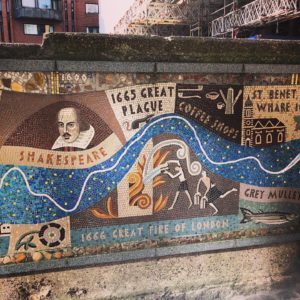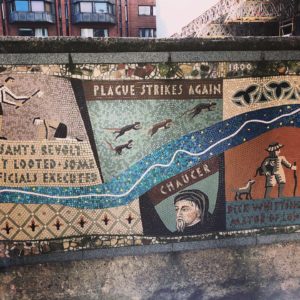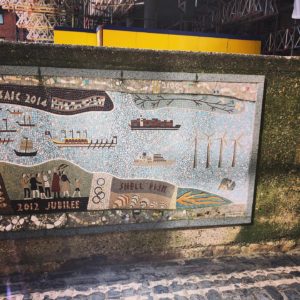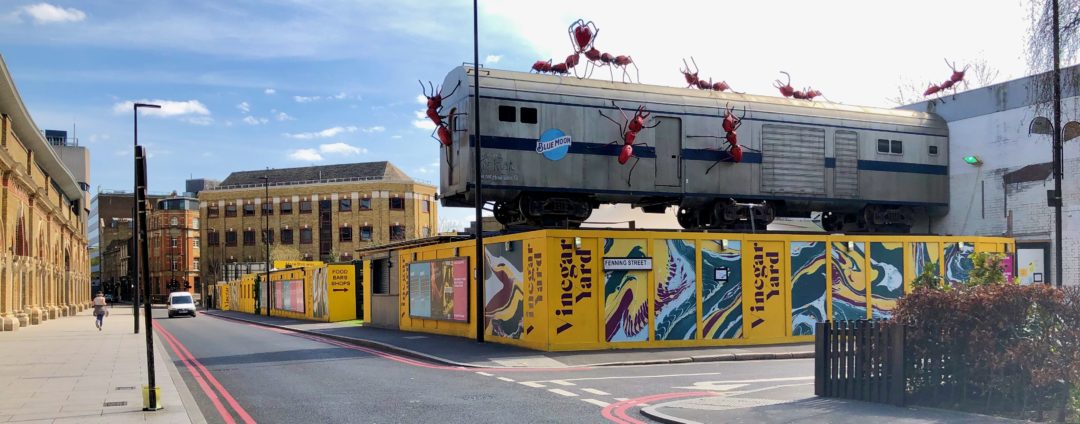This episode of the CityBites ‘Connections’ podcast series is on the evolving relationship between culture and place. You’ll hear how different types and scales of organisation are mitigating the damage to the creative sector… how society, government and the market are reassessing culture’s value to local identity and economy… and what aspects of this changing world could be with us for the long term.
In cases like the Southbank Centre, ‘London’s living room’, culture creates and defines place. Normally audiences flock to these destinations, but so do people who just want somewhere inviting to meet, work or pass the time at no charge. Now too many venues – whether single- or multi-purpose – stand empty, and as guest Gillian Moore points out, the generally sensible move to diversify revenue has had awful knock-on effects as the pandemic hit tenant businesses.
At the other end of the spectrum, individual artists and freelancers from fashion to video face an economic cliff-edge, though some help has come – often from each other. For some, this massive disruption could force a change of career. Even if individuals come out OK, will the neighbourhoods where they made and shared creative output be the poorer?
Somewhere between the two lies public art: beautifying barriers, making statements, cheering us up – and in recent years, claiming more space in development and regeneration schemes. It’s worth considering how climate action could intersect here. The creative industries were worth £306m a DAY to the UK economy in 2018 and had been on the ascendant; that talent and investment will be seeking a new outlet, and both climate action and cultural delivery can be very effective at ground level. That’s a topic for another podcast…


 .
. 
Today’s guests have been working to reduce the pandemic’s damage to culture and place across all scales:
Gillian Moore CBE is Director of Music at the Southbank Centre. She has worked at bringing music and the arts to London and international audiences for more than 35 years, including efforts to integrate education and the arts. She held leadership roles at the London Sinfonietta before joining Southbank in 2006 and was awarded an MBE in 1994 and a CBE in 2018 for her services to music. She also writes and broadcasts regularly about music, and you can find her on BBC3 – or see her championing column on the Southbank Centre here.
“People do happen across the Southbank because they just happen to be wandering along the riverfront. But we can never take that for granted. We know that even people who live half a mile or a mile away, kids who live on local estates, they’ve not seen the River Thames. So we have to make lots of extra effort to be in different places.” – Gillian Moore
Aida Esposito is founder-director of creativethinking, a cultural strategist for cross-sector clients and co-director of the Tottenham Creative Enterprise Zone. She is a passionate cultural and creative specialist who has delivered innovative strategy, development and projects around the world. Through the pandemic, among other things, Aida has been connecting councils with individual artists and small businesses to generate work and help shape what places can look like.
“I think arts organisations will become much more savvy about how they use digital to augment what they’re trying to do, what they’re trying to say, and how they show work. Hopefully we will have a digital world which is complementary, another public space to use and engage with alongside other more physical manifestations.” – Aida Esposito
Paul Augarde is an award-winning placemaking strategist, working with cross-sector clients on socioeconomic and cultural regeneration strategies and focusing on resilient mixed communities. He’s an associate at Coherent Cities and WorkWild and a board member of arts charities ACAVA and UP Projects. Paul was core to the creation of Poplar Works and helped direct the £1.5m Creative Workspace Resilience Fund on behalf of the Mayor and the Creative Land Trust.
“What the creative workspace sector has done really cleverly is support their tenant base. So as and when we come out of this, they will still have a strong market and a strong set of tenants. Whereas I suspect within certain parts of the private sector, that won’t be the case and they won’t have built that strength.” – Paul Augarde
Listen to the podcast to hear their lively debate…
or check out these resources:
- Browse the Bow Arts resource hub for artists and makers
- See if you can make use of ACAVA’s hardship fund guidance for artists
- If you can’t get out or want inspiration for your own work, check out LB Lambeth’s Elevate hub, a range of cultural activities, shows and challenges all free and accessible from home.
- Check out the London Mural Festival (Festival was in Sept 2020, but the artwork will endure…)
-
For Tottenham Creative Enterprise Zone including the Shutter Gallery, Instagram MadebyTottenham or sign up to the bulletin. Website and directory go live 1 October at madebytottenham.com
- For a digital arts programme that predates lockdown, see UP Projects’s This is Public Space programme
- For confirmation of culture’s value in placemaking – up to and hopefully well beyond the pandemic – here’s a reminder of how the Mayor’s recent Good Growth Fund round was allocated.
Catch all podcast episodes on Future of London’s City Bites page.



The wonderful Queenhithe mosaic of London’s history seems particularly apt & the far end still has room for our current disaster. Designed by Tessa Hunkin and executed by South Bank Mosaics under the supervision of Jo Thorpe [thanks to Spitalfields Life for the info]


